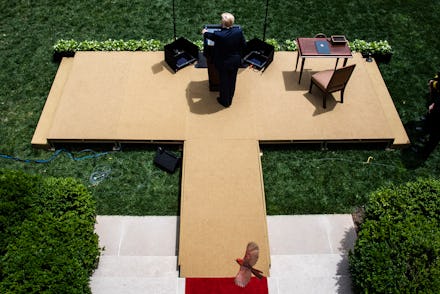Trump's RNC speech scheme isn't a sign of strength. It's a sign of laziness

President Trump this week seemingly confirmed longstanding rumors that he would deliver his Republican National Convention speech from the White House lawn, telling the New York Post on Thursday evening that "we’d do it possibly outside on one of the lawns, we have various lawns, so we could have it outside."
Inspiring stuff, truly.
Delivering an acceptance speech for his party's official presidential nomination from the White House presents a series of problems for the president, not least of which is the fact that doing so is an almost certain violation of the Hatch Act — a decades-old rule that prevents administration employees from engaging in campaign activities. While the president himself is exempt from the rule, his various staffers necessary for pulling off a major national address from the White House lawn are not.
Legal issues aside — and when has legality ever really been an issue for this administration, especially when it comes to Hatch Act violations — Trump's admission that he plans to give his campaign acceptance speech from the White House shows just how lazy and unimpressive the his r-election gambit really is.
Presumably, Trump believes that by delivering his speech from the White House lawn ("It’s very big, a very big lawn" he told the Post) he will be re-enforcing the sense of power and authority that comes with being president. But does the American public really need reminding that Trump is already president? If anything, he's spent his past three-and-a-half years in office squandering the ornamental trappings of the White House on bumbling Rose Garden press conferences and inane prime time Oval Office broadcasts. Just a few months ago he claimed that being president gave him "total" authority over the country, and time and time again he's reminded us of his winning electoral map. He's not shy about claiming the office.
But whatever power and mystique this president might think the White House's gleaming facade affords him, the effect has long since been rendered dull and unimpressive by his over-reliance on this supposed aura of power to cover for his many, many, many personal and professional failings.
Put another way: If Trump wants people to be impressed that he's speaking from the White House ("It is a great place. It’s a place that makes me feel good, it makes the country feel good," he explained) then he'd better hope that the entire country has somehow whacked its collective noggin so damn hard that we're now all suffering from collective amnesia, with no recollection of the dozens upon dozens of times he's used the White House as a prop and still managed to deliver a blundering performance.
Consider, as well, Trump's first nomination acceptance speech, back in the halcyon days of 2016. Much like the president himself, the setting at the Republican National Convention that year was gaudy, ostentatious, and an exercise in deranged self-aggrandizement, with the then-candidate's name splashed across a massive screen in huge golden block letters.
This time around, the president won't have an arena of cheering fans, or a full-frontal digital assault reminiscent of 1984. I'm sure he'll come up with some ad-hoc tricks and set design innovations to help add a sense of import to his White House speech, but when all is said and done, it will still be the president as we've seen him for the past few years: old, tired, and entirely out of place in the shadow of a building which he thinks merely occupying is enough to convince the public — and himself — that he really deserves to be there.